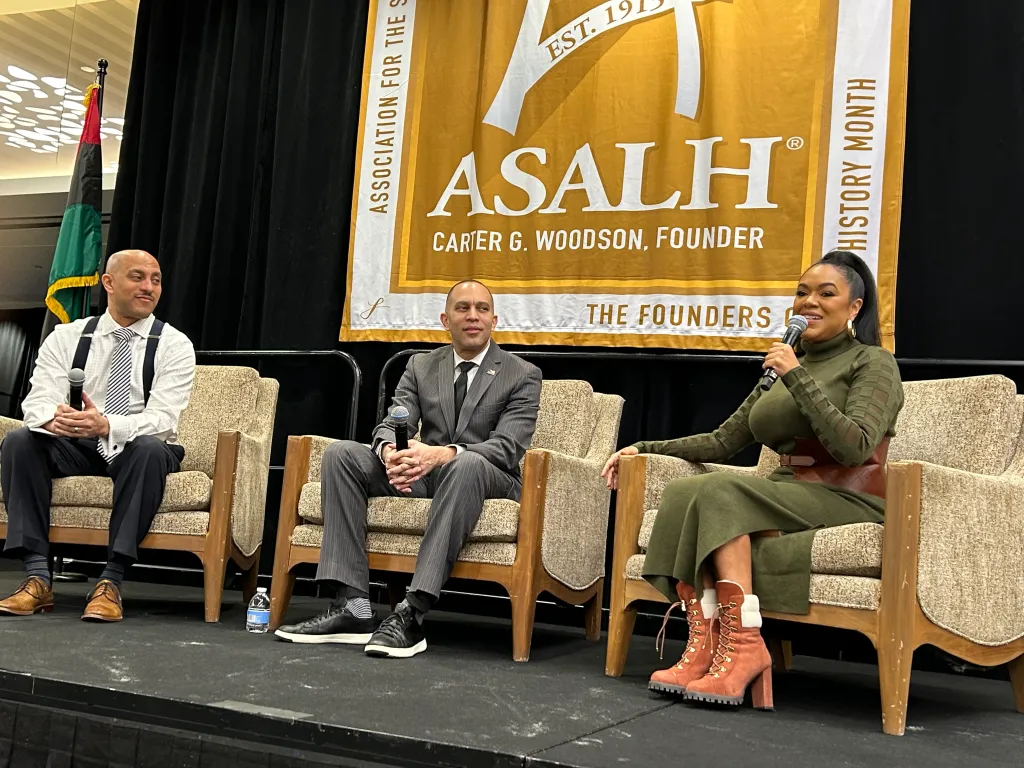
During the final weekend of Black History Month 2024, Congressman Hakeem Jeffries and his younger brother and college professor, Dr. Hasan Jeffries, sat down to discuss the current political season and the recent backlash against African Americans.
Their conversation served as the centerpiece of an annual Black History Month luncheon, sponsored by the Association for the Study of African American Life and History (ASALH), which resumed this year as an in-person event after previously being held remotely due to the COVID pandemic.
The luncheon, held at the Westin Washington, DC on Feb. 24, also included the unveiling of the 2024 Black Heritage Stamp featuring civil rights legend and noted American jurist, Constance Baker Motley.
TV personality, political analyst and author, Tiffany Cross, moderated the discussion between Rep. Jeffries, the U.S. House Minority Leader, and Dr. Jeffries, an author and history professor at The Ohio State University.
Cross asked both men what words of wisdom and encouragement they would offer to Black voters, especially younger ones, who may either be reluctant to cast their vote during their state primaries and the general election or believe that their vote doesn’t matter.
“In this current political season, particularly with Donald Trump as the Republican front-runner for president, we have to acknowledge that we’re in a backlash moment,” Dr. Jeffries said. “These moments aimed at African Americans are white America’s response to advances that have been achieved by Blacks and they continue to occur periodically on the heels of significant political gains that Blacks have secured despite formidable odds.
“For example, after Reconstruction came the rise of the Ku Klux Klan and Jim Crow. After the Civil Rights Movement, Richard Nixon ushered in another backlash which began with the mass incarceration of Blacks, Latinos and the poor. And after the election of America’s first Black president, Barack Obama – often seen as an era of enlightenment for Blacks – the next wave of backlash against African Americans kicked off with the rise of the Tea Party, the rolling back of voting rights in 2013 by the U.S. Supreme Court and additional efforts to suppress the rights of voters.
“The election of Donald Trump in 2016 was partially successful because Trump was able to convince white voters to believe the lie that Obama was not born in the U.S. What is required to stem the tide? Righteous intensity on our side which is something that we’ve called upon time and time again,” Dr. Jeffries said.
Congressman Jeffries said voters should be leery of statements which politicians make and claim to be facts, especially Trump. In other words, voters must do their homework.
“The former president has proven to be a master of manipulation, spinning tales and saying things which he knows are not true. He repeats them so often, that people – many people – begin to believe him,” Rep. Jeffries said. “Trump was able to connect to voters with his ‘facts’ and his messaging.
“He had one sentence for white America: ‘This is your last chance’ – probably a reference to Obama and therefore a racially-based statement. For Black Americans he had one sentence, too: ‘What the hell do you have to lose?’ – appealing to Blacks because of our long legacy of oppression in America.”
When asked how he would address apathetic Black voters, Dr. Jeffries said it’s important for Blacks to engage in serious conversations about white voters who support Trump and who both he and his brother agreed fall into two categories: 1) those animated by Trump’s racism, sexism and xenophobia; and 2) those who are okay with it and aren’t bothered by it. They added that while the exact numbers of voters that comprise each category may be impossible to determine, the last time Trump ran for president, 70 million voters [of all races, it should be noted] said “yes.”
“So, we don’t have a choice,” Dr. Jeffries said. Voting is necessary but insufficient. We can’t just vote and think we’re done. We have to hold elected officials accountable. We have to protest. We have to recognize messaging that specifically targets Black voters and we have to come armed with criticism of that messaging.”
